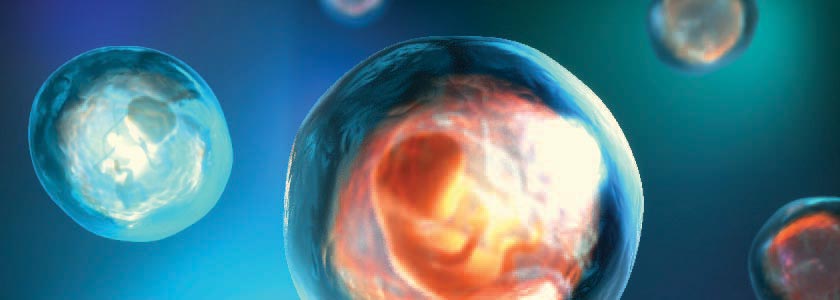Report: The world is (still) not ready for CRISPR babies

In late 2018, Chinese scientist He Jiankui announced that he had successfully used CRISPR-Cas9 to modify the DNA of two human embryos before birth, an act that apparently created the world’s first gene-edited human “CRISPR babies.”
He reportedly was working on a project to help people with fertility problems—in this case, it was an HIV-positive father and an HIV-negative mother, and He, who was a scientist at the Southern University of Science and Technology in Shenzhen, edited the CCR5 gene in the embryos to make them genetically resistant to HIV. The first babies whose genes were edited with CRISPR were twin girls born in October 2018, with a third baby born in 2019. All were reportedly born healthy.
Response to the birth of CRISPR babies
The reaction to He’s announcement was swift and decisive. He had applied with a Chinese clinical trial registry to conduct the experiment, but the experiment had no independent confirmation and was not peer reviewed. Chinese authorities suspended his research activities, and he was detained on campus and later fired by the school. Scientists in China and around the world criticized the research, and He was eventually sentenced to three years in prison and a fine of more than $400,000; two co-collaborators were also indicted but found guilty of lesser offenses.
CRISPR gene editing techniques have been successfully used in everything from zebrafish to mice and pigs to non-human primates—and have even given us hornless cows. The next frontier is CRISPR gene editing in humans. A study published earlier in 2020 noted preclinical research of CRISPR therapy in laboratory models of Duchenne muscular dystrophy, perinatal lethal respiratory failure, and genetic deafness.
It’s possible that CRISPR editing could be successfully used to edit genes in human embryos, but for now, it’s simply too risky to do so, a high-profile international commission announced in September.
The Sept. 3 report was authored by officials from the National Academy of Medicine, the National Academy of Sciences, The Royal Society, and the International Commission on the Clinical Use of Human Germline Genome Editing.
A summary of the report noted that the idea behind He’s work was not irrational—“Heritable human genome editing could represent an important option for prospective parents, with a known risk of transmitting a genetic disease, to have a genetically related child without that disease and its associated morbidity and mortality.”
However, the report continues, there is no framework anywhere in the discipline—or on the planet, for that matter—that lays out “safe and effective methodologies that could form the necessary steps in a translational pathway for any clinical uses of heritable human genome editing.” Once such a methodology is developed, the report adds, individual countries must debate both the ethical and scientific considerations of CRISPR gene editing in humans, which should include unmet needs, long-term societal implications, issues of cost and access, and local ethical, moral, and religious views.
Establishing a framework for CRISPR gene editing in humans
Before science can progress with genetic editing in humans, the report said, science must first decide how to progress in the first place. Unknowns that must be figured out include connections between genetic changes and health, an understanding of the limitations of human genome editing, and an understanding of the limitations of genome editing in embryos. To those ends, the report makes a number of recommendations:
- No genome editing in human embryos should take place until it’s possible to do so without causing undesired changes in the embryos, and the process should be reliable and efficient.
- A major national conversation needs to take place to decide if heritable human genome editing should even take place.
- If editing goes forward, it should be limited to cases when a single gene mutation, solely responsible for causing a “serious” disease, can be safely and effectively changed in cases where there are no other options.
- No pregnancy should be established with a gene-edited embryo until evidence shows it can be done efficiently and precisely.
- Evaluation of human embryos prior to transferring to the mother should include developmental milestones and a biopsy that shows there are no unintended edits or additional off-target variants.
- Research into the development of methods to produce functional human gametes from cultured stem cells should continue, as the more stem cell-derived gametes there are, the more options prospective parents have.
- Any country where the use of human genome editing is being considered should have mechanisms and competent regulatory bodies in place to ensure best practices, ethical work, informed decision making, a sound review of science and ethics, publicly accessible application details, and open discussion about the results of relevant work.
- An international scientific advisory panel should be established to review data, provide input, and publish updates on advances in related technologies and research. There should also be a diverse international body that can evaluate and make recommendations on any proposed new class of use, and an international mechanism through which concerns about research or conduct could be raised.
Researching the safety of CRISPR gene editing in humans
The bottom line?
“The technology is not presently ready for clinical application,” Richard Lifton, president of the Rockefeller University in New York City and co-chair of the commission, told Nature.
How long it takes to get to that point is a matter of open debate. Haoyi Wang, a developmental biologist at the Chinese Academy of Sciences’ Institute of Zoology in Beijing and a member of the commission, told Nature it could be years before CRISPR editing techniques are perfected to the point where they don’t generate unwanted changes in genes and produce streamlined outcomes.
Notably, the commission’s findings were not universally praised. One critic was Sarah Norcross, the director of the U.K.’s Progress Educational Trust. She said, “The circumstances in which the world’s first genome-edited babies were born in 2018 were lamentable, both scientifically and ethically, and lessons needed to be learned. Unfortunately, this report goes too far in the other direction. The criteria the report sets out, for the first acceptable clinical use of germline genome editing in humans, are far too narrow. Furthermore, the report strays beyond its scientific remit ... The World Health Organization is still deliberating on the governance of genome editing, and should not feel constrained by this report’s governance recommendations if it sees fit to deviate from them.”
Another critic was Dr. Helen O’Neill from University College London. O’Neill noted that the standards set forth in the report are not the same as the ones used for in vitro fertilization.
“Stating that, ‘A biopsy should demonstrate that the intended edit is present in all biopsied cells, with no evidence of unintended edits’ seems out of touch with the current practice of a threshold criteria for transfer of mosaic aneuploid embryos,” O’Neill said.
Denis Rebrikov, a Russian DNA sequencing specialist pursuing a project to correct a deafness mutation in couples who each have the aberrant gene, said the report’s recommendations were so narrowly drawn that the cases for which the commission would allow germline editing would be exceedingly rare.
The vast majority of comment following the commission’s report, however, was supportive, with some cautioning that such editing likely could never be allowed.
“I continue to struggle to imagine plausible situations in which clinical germline editing provides a path forward to address an unmet medical need that cannot be provided by other options,” Harvard University chemist David Liu told Science.
He’s sentencing—the court ruled that He pursued the editing for “fame and profit”—and penalties effectively put an end to his gene-editing career. For now, as Wei Wensheng, a gene-editing researcher at Peking University in Beijing, told Nature, the punishments “are definitely a deterrent to similar misconduct in China.”
Acts like the sentences, the commission’s report, and the newly-established Scientific Citizenship Initiative, a Harvard program which aims to align scientific research with societal needs, point to the fact that science is becoming more socially aware, equitable, and just, wrote molecular biologist and Yale scholar Natalie Kofler.
“Editing the genes of embryos could change our species’ evolutionary trajectory,” Kofler wrote. “Perhaps one day, the technology will eliminate heritable diseases such as sickle-cell anemia and cystic fibrosis. But it might also eliminate deafness or even brown eyes. In this quest to improve the human race, the strengths of our diversity could be lost, and the rights of already vulnerable populations could be jeopardized ... Compassion allows us to see the twin babies with altered genomes as living, breathing humans whose health (and whose future children’s health) might be compromised. Humility reveals how little we know about this nascent technology and the potential risks that these girls are now burdened with.”


 Processing
Processing
